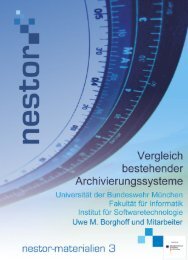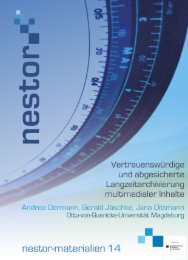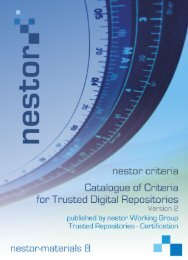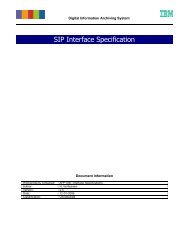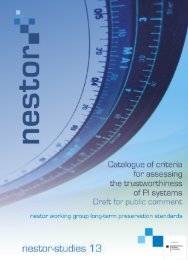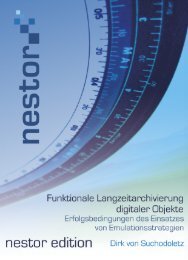Download (PDF, 9MB, Not barrier-free file.) - Nestor
Download (PDF, 9MB, Not barrier-free file.) - Nestor
Download (PDF, 9MB, Not barrier-free file.) - Nestor
- No tags were found...
Create successful ePaper yourself
Turn your PDF publications into a flip-book with our unique Google optimized e-Paper software.
epository focused primarily on the provision of access services is questionable as therelational databases seem sufficient to fulfill all necessary tasks. Thus, while the creationof actual packages might be required when exporting data to the long-term archive, itdoes not seem a necessity for the repositories' data management.Administration: All three repositories have some kind of policy document expressingtheir commitment to long-term preservation in various degrees, depending on how far theyhave progressed in planning and implementing a long-term preservation workflow. Itseems, however, that JUWEL in particular should consider to combine policy informationcontained, for example, in its Frequently Asked Questions or the Help page, in a singlepolicy document reflecting both its commitment to Open Access and addressing relevantquestions of long-term preservation. For all three repositories it seemed that additionalpolicies or guidelines governing workflows and processes, often already existing in implicitform, should be “spelled out” (i.e. written down and made explicit) for the purpose ofquality assurance. 168Among the most difficult tasks to be carried out by the repositories in theAdministration functional entity appeared to be the definition of their designatedcommunities (depositors and users) and their respective knowledge bases. While pedocsserves only to the community of a single (albeit strongly subdivided) discipline, bothJUWEL and Qucosa cover a wide range of different disciplines; on the other hand, JUWELhas the advantage of a relatively closed community of depositors, whereas Qucosacollects submissions from a very heterogeneous group of Saxon institutions in highereducation, business, and administration, and pedocs – as a subject repository – acceptssubmissions from authors in the field of educational science and research regardless oftheir affiliation. This difficulty to define the designated communities of the repositories hasdirect implications for Preservation Planning in that only a defined community can bemonitored. While it seemed that both JUWEL and pedocs already have mechanisms andcommunication channels established (although these, it should be noted, are notnecessarily “institutionalized” in all cases) allowing them to receive feedback from at leastportions of their designated communities, Qucosa is in a much more difficult situationwhen it comes to monitoring its designated communities. As suggested, Qucosa mighttherefore attempt to focus on a “model” designated community, e.g. the users anddepositors from the TU Dresden for which it serves as an institutional repository, while atthe same time depending on the other submitting institutions to monitor the designatedcommunities for their own publications.In conclusion, it seems that the repositories considered in this study will face twomajor challenges in the future. On the one hand, the relation between the repositories andthe long-term preservation service provider will have to be defined thoroughly, including168 Some guidance as to institutional preservation policies is provided by Beagrie et al. (2008), or theOpenDOAR Policies Tool, which covers policies on submission, metadata, and preservation among others.See http://www.opendoar.org/tools/en/policies.php – 03.11.2009.78



